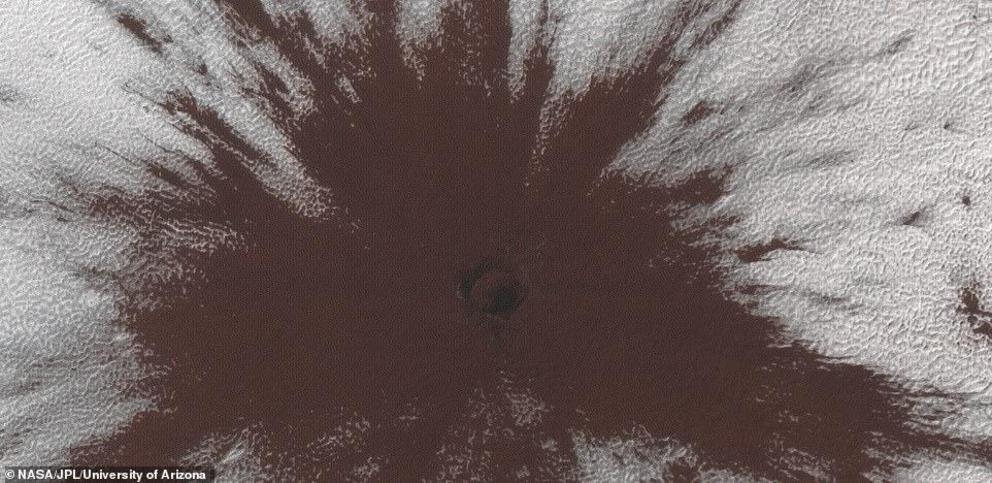Astronomers spot fresh crater on Mars caused by mysterious impact so powerful it smashed through the planet's ice cap
- Impact occurred between July and September 2018, images from the Mars HiRISE craft reveal
- Huge impact smashed through the ice at the planet's southern ice cap, sending debris into a unique pattern
Astronomers have spotted a huge new impact crater on Mars.
Formed between July and September 2018, the huge impact smashed through the ice at the planet's southern ice cap, sending debris into a unique pattern.
This revealed a unique 'two tone' blast impact.
Formed between July and September 2018, the huge impact, believed to be caused by a meteorite, smashed through the ice at the planet's southern ice cap, sending debris into a unique pattern.
'When an impactor hits the ground, there is a tremendous amount of force like an explosion,' said HiRISE co-investigator Ross Beyer.
The larger, lighter-colored blast pattern could be the result of scouring by winds from the impact shockwave, he believes.
'When an impactor hits the ground, there is a tremendous of force like explosion.
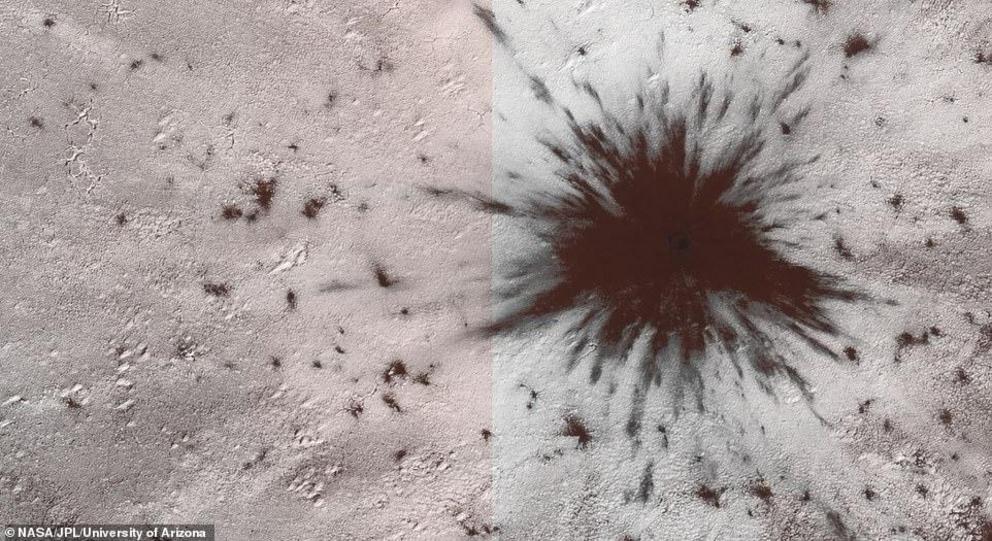 The darker inner blast pattern is because the impactor penetrated the thin ice layer, excavating the sand underneath and threw it out in a directions
The darker inner blast pattern is because the impactor penetrated the thin ice layer, excavating the sand underneath and threw it out in a directions
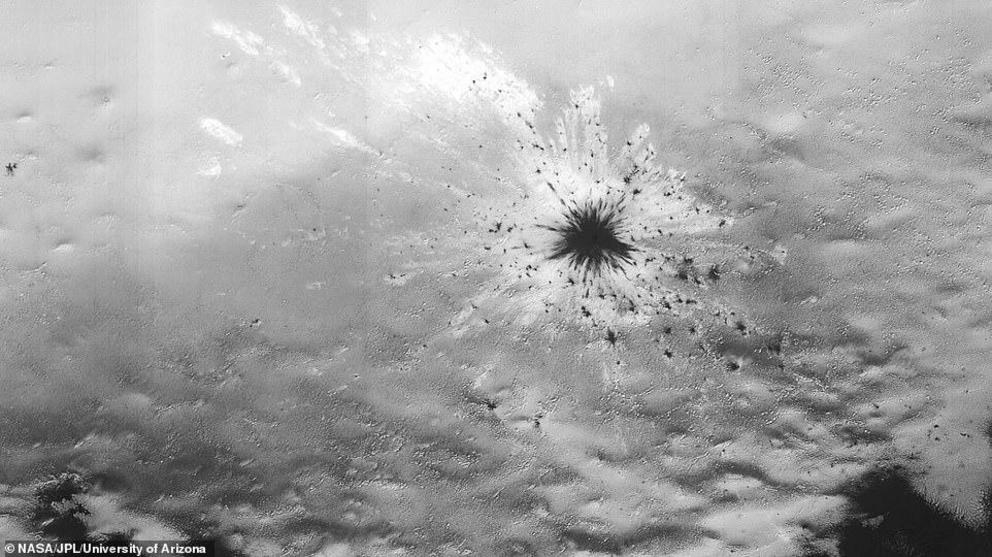 The larger, light colored blast pattern could be the result of scouring winds by the impact shockwave, researchers believe
The larger, light colored blast pattern could be the result of scouring winds by the impact shockwave, researchers believe
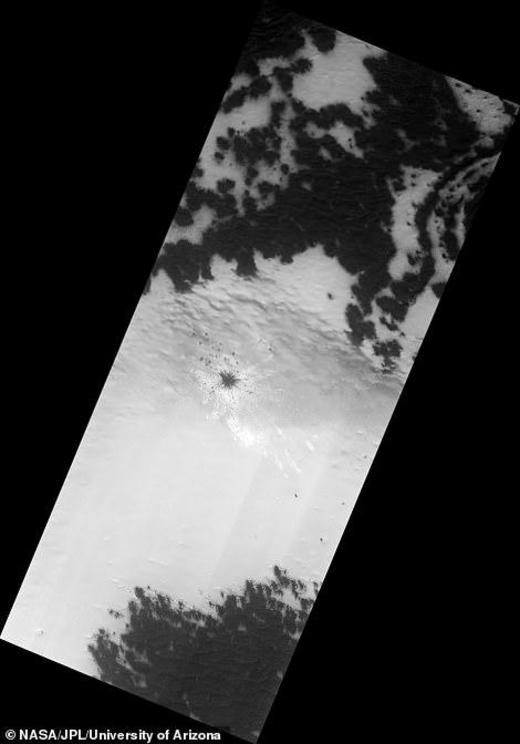 Formed between July and September 2018, the huge impact smashed through the ice at the planet's southern ice cap, sending debris into a unique pattern. Pictured, a wide view of the area
Formed between July and September 2018, the huge impact smashed through the ice at the planet's southern ice cap, sending debris into a unique pattern. Pictured, a wide view of the area
'The larger, light colored blast pattern could be the result of scouring winds by the impact shockwave.
'The darker inner blast pattern is because the impactor penetrated the thin ice layer, excavating the sand underneath and threw it out in a directions.
The Mars Reconnaissance Orbiter's High Resolution Imaging Science Experiment (HiRISE) camera snapped the amazingly detailed pictures of the fresh craters
A 2013 study found there are more than 200 asteroid impacts on the Red Planet every year.
Asteroids and comet fragments are usually no bigger than 3 to 6 feet (1 to 2 meters) across — about 10 times smaller than the meteor that exploded over Chelyabinsk, Russia, in February.
The holes gouged out by these asteroids are typically at least 12.8 feet (3.9 meters) wide, the researchers say.
The 200-per-year space rock impact rate for Mars was based on a portion of the 248 new Martian craters that have been identified in the past decade using images from the Mars Reconnaissance Orbiter, a NASA spacecraft that has been circling the Red Planet since 2006.
'The impact hit on the ice layer, and the tones of the blast pattern tell us the sequence,' explained HiRISE co-investigator Ross Beyer, in a statement.
'When an impactor hits the ground, there is a tremendous amount of force like an explosion.
'The larger, lighter-colored blast pattern could be the result of scouring by winds from the impact shockwave.'
THE 'CHRISTMAS CRATER' ON MARS
It is a picture perfect Christmas card image from another planet.
The European Space Agency's Mars Express has returned an incredible new series of images showing a giant crater on the red planet.
It shows the Korolev crater, a 50 mile (82 km) wide feature in in the northern lowlands of Mars.
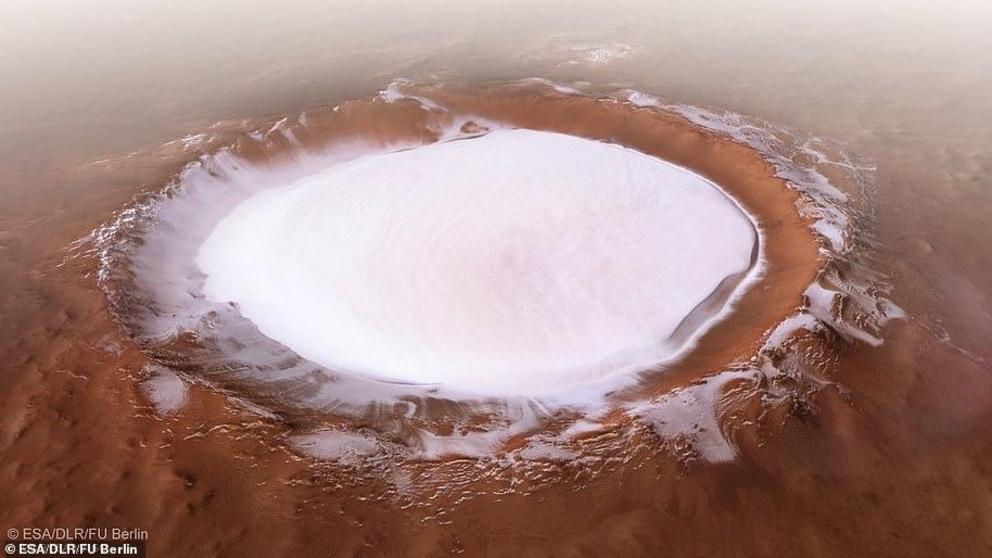 The European Space Agency's Mars Express has returned an incredible new series of images showing the Korolev crater, a 50 mile (82 km) wide feature in in the northern lowlands of Mars
The European Space Agency's Mars Express has returned an incredible new series of images showing the Korolev crater, a 50 mile (82 km) wide feature in in the northern lowlands of Mars

